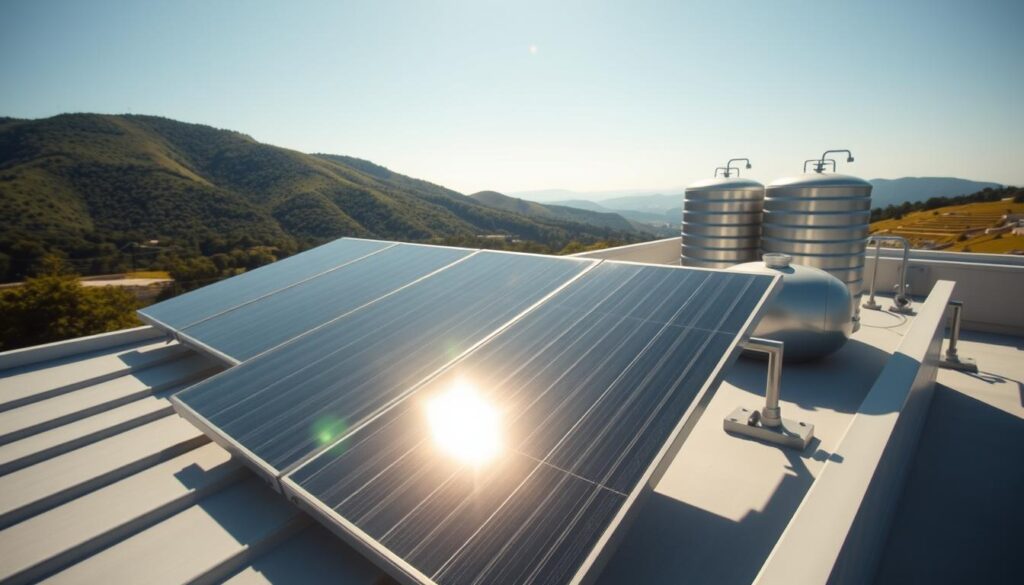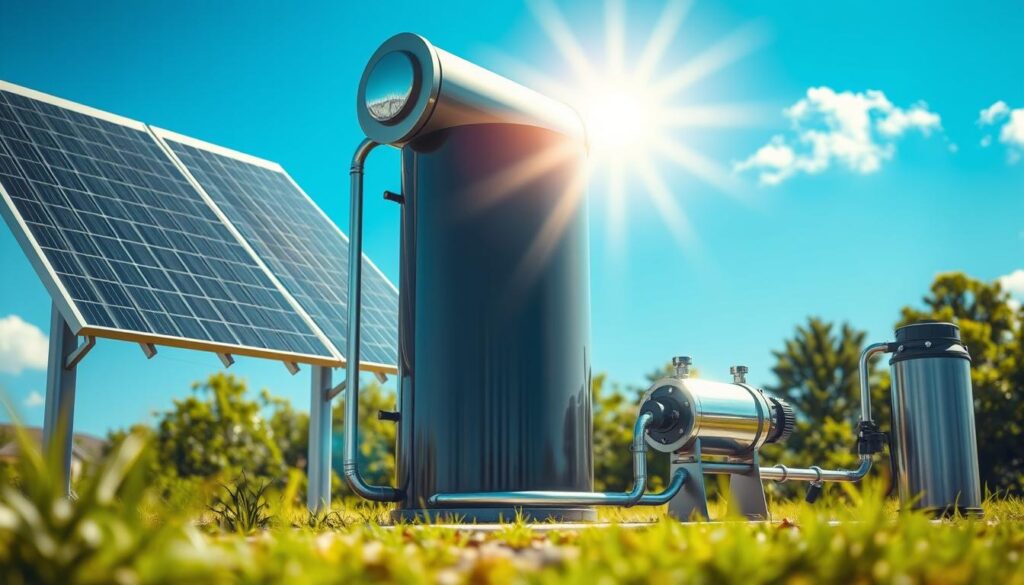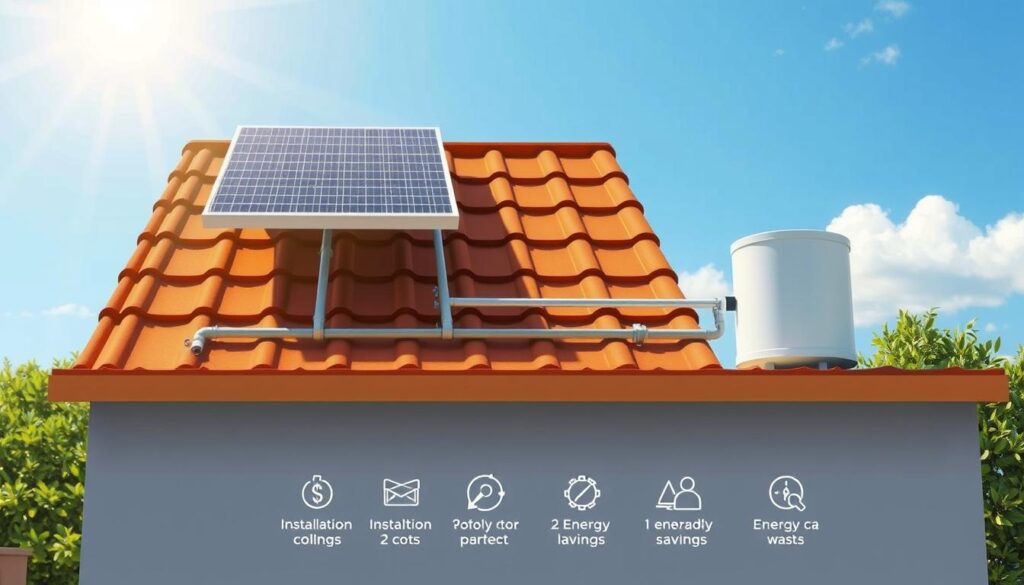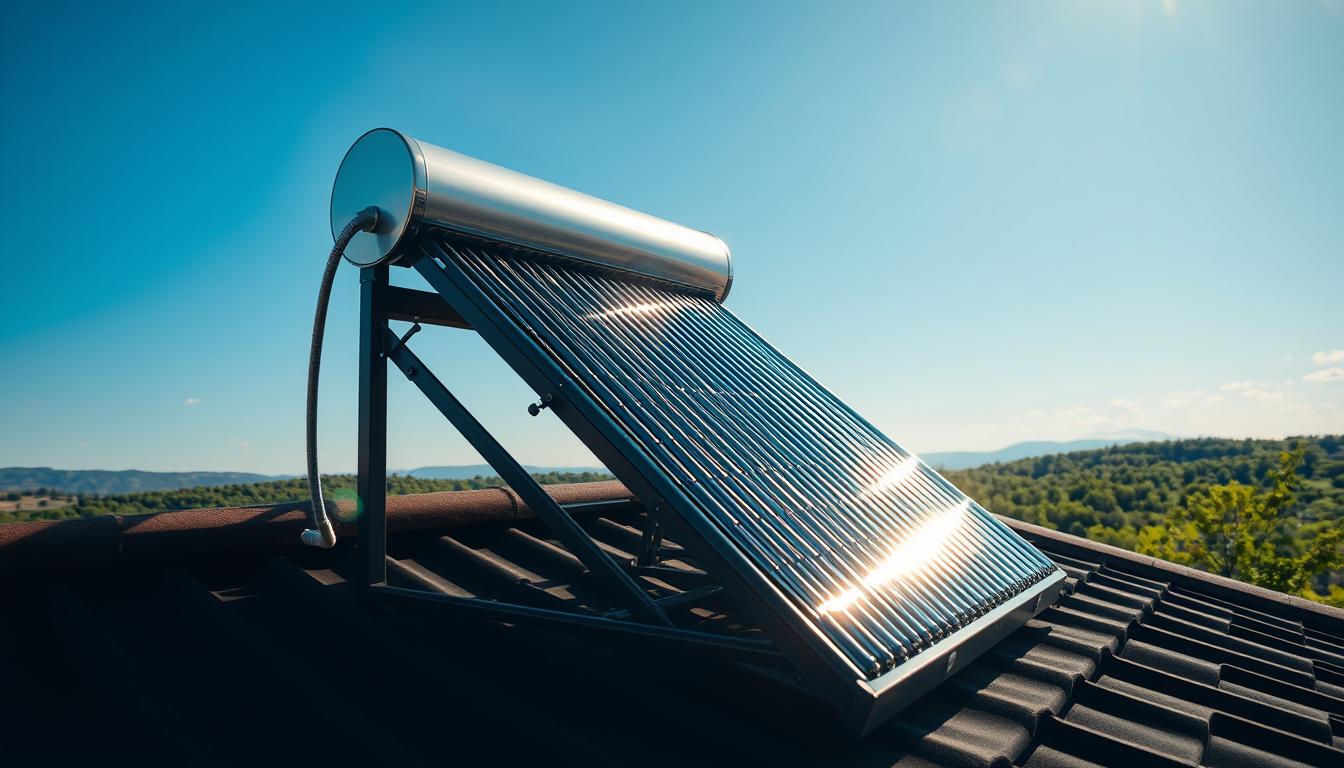Ever thought about using the sun to warm your shower water? Let’s explore the magic of solar powered water heaters. These devices are changing how we heat water at home.
Solar water heating systems are like the Swiss Army knives of renewable energy. They’re flexible, efficient, and work in many climates. Imagine cutting your water heating costs by half, or even more! It’s a big win for your wallet and the planet.
These sun-powered water heaters are built to last. They often outlive traditional heaters by years. So, if you’re ready for solar-powered hot showers, keep reading. I’ll share all you need to know about these eco-friendly wonders.
Key Takeaways
- Solar water heaters can slash water heating bills by 50-80%
- They work effectively in various climates
- These systems typically last up to 20 years
- Two main types: active and passive systems
- Solar heaters outperform traditional gas and electric models
Introduction to Solar Powered Water Heaters
I’ve been looking into eco-friendly hot water solutions, and solar powered water heaters are amazing! They’re becoming super popular, with a big jump in solar energy use expected. It’s like the sun is throwing a big party, and everyone’s invited!
Solar thermal water heating systems are all the rage. They use the sun’s power to heat water, unlike traditional heaters that use a lot of energy. It’s like having a mini sun on your roof, working hard to keep your water warm!
Let’s compare these solar stars to traditional water heaters:
| Feature | Solar Water Heater | Conventional Water Heater |
|---|---|---|
| Energy Source | Sunlight | Electricity or Gas |
| Environmental Impact | Low | High |
| Long-term Cost | Lower | Higher |
| Maintenance | Minimal | Regular |
If you want to make your home greener and save money, consider a solar powered water heater. Your wallet will appreciate it, and so will the planet!
How Solar Water Heaters Work
I’m excited to explore the world of clean energy hot water tanks! These systems use the sun’s power to give you hot water. Let’s see how this green technology works.
Solar Collectors
The core of a solar water heater is its solar collectors. These devices soak up sunlight, turning it into heat. It’s like a giant, high-tech sunbather on your roof, soaking up rays!

Storage Tanks
After capturing the sun’s energy, it’s stored in a tank. This tank keeps your water warm, ready for your next shower or dishes.
Heat Transfer Process
Now, let’s see how we get that heat to your taps. Some systems pump water through collectors, while others use a special fluid. It’s like a hot potato game, but we deliver hot water to your home!
Clean energy hot water tanks are either active or passive. Active systems use pumps, while passive ones use gravity and convection. Either way, you get eco-friendly hot water easily!
Types of Solar Water Heating Systems
Solar water heating systems come in two main types: active and passive. Each has its own benefits. Let’s explore these systems to see which is best for your home.
Active Systems
Active systems use pumps to move water or heat-transfer fluid. They’re efficient but complex. There are two main active systems:
- Direct circulation systems: These pump household water through the collectors.
- Indirect circulation systems: These use a heat-transfer fluid and a heat exchanger to warm household water.
Passive Systems
Passive systems use natural convection to move water. They’re simpler and reliable. There are two main passive systems:
- Integral collector-storage systems: These combine the collector and storage tank into one unit.
- Thermosyphon systems: These use hot water’s natural rise to circulate.
| System Type | Efficiency | Complexity | Best Climate |
|---|---|---|---|
| Direct Circulation | High | Moderate | Non-freezing |
| Indirect Circulation | High | High | Any |
| Integral Collector-Storage | Moderate | Low | Mild |
| Thermosyphon | Moderate | Low | Warm |
Choosing a system depends on your climate, budget, and needs. Direct systems are good for warm places. Indirect systems are best for cold areas.
Components of a Solar Water Heater
I’ve always been fascinated by the inner workings of solar water heaters. Let’s dive into the key parts that make these eco-friendly marvels tick!

Solar collectors are the heart of any solar water heating system. They come in three main flavors: flat-plate, integrated collector-storage (ICS), and evacuated-tube. Flat-plate collectors are like sunbathing champions – they’re insulated boxes with dark absorber plates that soak up the sun’s rays.
Storage tanks are the unsung heroes of solar water heaters. They keep your hard-earned hot water ready for use, even when the sun’s playing hide and seek. Most systems have a backup conventional water heater for those cloudy days or when you need extra hot water for that impromptu pool party.
Heat exchangers are the matchmakers in indirect systems. They transfer the sun’s warmth from the collector fluid to your household water without any awkward introductions. It’s like a blind date for heat molecules!
- Flat-plate collectors: Sun-soaking champs
- ICS systems: 2-in-1 collector and storage tank combo
- Evacuated-tube collectors: High-tech glass tubes with inner metallic absorbers
With these components working together, your solar water heater becomes a lean, mean, water-heating machine. It’s like having a miniature sun powering your showers!
What Is a Solar Powered Water Heater?
I’m excited to explore solar powered water heaters! These devices are changing the game in renewable hot water systems. Let’s see what makes them special and why they’re becoming popular in the U.S.
Definition and Basic Concept
A solar powered water heater uses the sun’s energy to warm water. It’s like having a mini sun god for your showers! This system includes collectors, tanks, and plumbing to work its magic.
Key Features
What makes these systems stand out? Here are some key features:
- Solar collectors that soak up UV rays
- Energy-efficient design for your wallet’s happiness
- Long lifespan, often beating traditional heaters
- Low operating costs after installation
Comparison with Conventional Water Heaters
Let’s compare these sun-powered wonders with traditional heaters:
| Feature | Solar Water Heater | Conventional Water Heater |
|---|---|---|
| Energy Source | Renewable solar energy | Electricity or gas |
| Operating Costs | Very low | Higher, dependent on energy prices |
| Initial Investment | Higher upfront cost | Lower upfront cost |
| Lifespan | 20-30 years | 10-15 years |
| Environmental Impact | Minimal | Higher carbon footprint |
While the initial cost might be steep, the long-term savings and eco-benefits are worth it. It’s like having a tiny power plant on your roof, always working for you!
Benefits of Solar Powered Water Heaters
I’ve found that solar powered water heaters are full of benefits. They’re changing the game in home energy solutions.
Let’s start with the big one: saving money on energy. Homeowners can cut their water heating costs by 50-80%! It’s like finding a golden ticket in your utility bill.
But there’s even more good news. These water heaters are also great for the planet. They produce zero emissions, making Mother Nature happy. It’s like having a superhero on your roof, fighting climate change one hot shower at a time.
Here’s a nifty table that sums up the perks:
| Benefit | Impact |
|---|---|
| Energy Cost Savings | 50-80% reduction in water heating bills |
| Environmental Impact | Zero emissions |
| Maintenance | Low requirements |
| Home Value Increase | 3-4% boost |
| Financial Incentives | Federal tax credits, potential state/local incentives |
These solar beauties are also easy to take care of. They don’t need much attention, so you can enjoy your hot water without worry. Plus, they can make your home value go up by 3-4%!
The best part? The government wants to thank you for going green. Solar water heaters qualify for federal tax credits, and you might get state or local incentives too. It’s like getting paid to save the planet – how cool is that?
Cost Considerations and Savings
I’ve been looking into solar water heater costs, and it’s really interesting. The initial cost might hurt your wallet, but the long-term savings are huge.
Initial Investment
Get ready for the upfront costs. Solar water heaters are an investment, not a cheap buy. You’ll spend about $100 per square foot of collector area. The total cost? It can be between $1,500 and $13,000, depending on the system’s size and complexity.
Long-term Savings
Now, things get really exciting. These systems can pay for themselves in 3-6 years. After that, you save money, a lot of it. Your energy bills will drop quickly, like a wool sweater in a hot dryer.
| Year | Estimated Energy Bill Savings |
|---|---|
| 1-3 | $300-$600 |
| 4-6 | $600-$1200 |
| 7+ | $1200+ |
Tax Credits and Incentives
Uncle Sam wants you to go solar! The federal solar tax credit gives you a 30% deduction on installation costs. And there’s more! Many states and local governments offer extra incentives, making solar water heaters even more affordable.

So, while the initial cost of solar water heaters might seem high, the long-term savings and incentives make it a smart choice. It’s like investing in a money-printing machine that runs on sunshine!
Installation Process and Maintenance
Installing a solar water heater is not a DIY job. You need a skilled solar thermal systems contractor. They make sure your system is safe and works well, considering your area’s solar resource, climate, and building codes.
The installation process includes:
- Checking your roof’s structure and orientation
- Mounting solar collectors
- Installing storage tanks and connecting pipes
- Setting up the control system
After installation, regular maintenance is crucial. Even passive systems need some care. This keeps your solar water heater in great condition.
Here’s a quick rundown of typical maintenance tasks:
| Task | Frequency |
|---|---|
| Clean solar collectors | Every 6 months |
| Check antifreeze levels | Annually |
| Inspect for leaks or corrosion | Every 3-5 years |
| Replace anode rod | Every 3-5 years |
Regular maintenance keeps your solar water heater running smoothly for years. A little preventive care can save you from expensive repairs later.
Factors to Consider Before Installing a Solar Water Heater
Before you get a solar water heater, there are a few things to think about. Let’s explore what you need to know before you start using solar power for your hot water.
Climate and Sun Exposure
Your local weather is very important for solar water heater efficiency. I live in a sunny spot, which is great for solar collectors. But, even in cooler places, there are systems that work well.
Home Structure and Space
Look at your roof carefully. Is it strong enough for solar panels? Do you have enough room for collectors and tanks? These are key things to think about. I had to make my roof stronger before installing, but it was worth it!
Local Regulations and Permits
Don’t forget to check your local building codes and zoning laws. Some places have special rules for solar installations. I had to get approval from my homeowners’ association, but it was easier than I thought.
- Check building codes
- Review zoning laws
- Consult homeowners’ association rules
Getting a professional to assess your home can help find the best system for you. It’s an investment that can save you money and increase your home’s value over time.
Conclusion
Solar powered water heaters are pretty cool. They use the sun’s power to heat your water. This cuts down on energy bills and reduces carbon footprint. It’s a win-win!
The initial cost might be a bit steep. But the long-term savings are worth it. You’ll save money on energy bills for years. Plus, there are tax incentives to help out.
Before getting a solar water heater, think about a few things. Is your home sunny enough? Do you have enough space? And what about local rules? If everything checks out, a solar water heater is a great choice. It’s a bright idea for hot showers powered by the sun!
FAQ
What is a solar powered water heater?
How do solar water heaters work?
What are the different types of solar water heating systems?
What are the key components of a solar water heater?
What are the benefits of using a solar powered water heater?
What are the costs and potential savings associated with solar water heaters?
FAQ
What is a solar powered water heater?
A solar powered water heater uses the sun’s energy to heat water. This water is for everyday tasks like bathing and washing dishes. It cuts down on your need for traditional energy, which can save you money.
How do solar water heaters work?
Solar water heaters have collectors that catch sunlight and heat water or a fluid. This heated liquid is stored in a tank until you need it. Some systems use pumps, while others rely on natural flow.
What are the different types of solar water heating systems?
There are two main types: active and passive systems. Active systems use pumps and controls, while passive systems don’t. Active systems can be direct or indirect, and passive systems include ICS and thermosyphon systems.
What are the key components of a solar water heater?
The main parts are solar collectors, storage tanks, and heat exchangers. Collectors can be flat-plate, ICS, or evacuated-tube. ICS systems combine the collector and tank, and evacuated-tube collectors use glass tubes with metallic absorber tubes.
What are the benefits of using a solar powered water heater?
Using a solar water heater can save you 50-80% on water heating costs. It’s also good for the environment and requires little maintenance. Plus, it can increase your home’s value. You might also get tax credits and other incentives.
What are the costs and potential savings associated with solar water heaters?
Prices range from
FAQ
What is a solar powered water heater?
A solar powered water heater uses the sun’s energy to heat water. This water is for everyday tasks like bathing and washing dishes. It cuts down on your need for traditional energy, which can save you money.
How do solar water heaters work?
Solar water heaters have collectors that catch sunlight and heat water or a fluid. This heated liquid is stored in a tank until you need it. Some systems use pumps, while others rely on natural flow.
What are the different types of solar water heating systems?
There are two main types: active and passive systems. Active systems use pumps and controls, while passive systems don’t. Active systems can be direct or indirect, and passive systems include ICS and thermosyphon systems.
What are the key components of a solar water heater?
The main parts are solar collectors, storage tanks, and heat exchangers. Collectors can be flat-plate, ICS, or evacuated-tube. ICS systems combine the collector and tank, and evacuated-tube collectors use glass tubes with metallic absorber tubes.
What are the benefits of using a solar powered water heater?
Using a solar water heater can save you 50-80% on water heating costs. It’s also good for the environment and requires little maintenance. Plus, it can increase your home’s value. You might also get tax credits and other incentives.
What are the costs and potential savings associated with solar water heaters?
Prices range from $1,500 to $13,000, averaging $100 per square foot. But, they can save you money over time, paying off in 3-6 years. The federal tax credit can cover 30% of costs, and local incentives might help too.
What factors should I consider before installing a solar water heater?
Think about your climate and your home’s sun exposure. Check local laws and your hot water needs. Compare costs and savings. A professional can help find the best system for you.
,500 to ,000, averaging 0 per square foot. But, they can save you money over time, paying off in 3-6 years. The federal tax credit can cover 30% of costs, and local incentives might help too.
What factors should I consider before installing a solar water heater?
Think about your climate and your home’s sun exposure. Check local laws and your hot water needs. Compare costs and savings. A professional can help find the best system for you.
What factors should I consider before installing a solar water heater?
Source Links
- Solar Water Heaters – https://www.energy.gov/energysaver/solar-water-heaters
- Your Ultimate Guide To Solar Water Heaters: Are They Worth It? – https://www.forbes.com/home-improvement/solar/solar-water-heaters-guide/
- Solar Water Heaters Explained (2024) – https://www.marketwatch.com/guides/solar/solar-water-heater/




Interesting read, but what about the efficiency in cloudy/rainy areas? Solar power isnt foolproof. Ever considered geothermal alternatives, guys?
Interesting guide but what about cloudy or snowy days? Solar energy isnt reliable in all climates, right? Need more on possible negatives.
Interesting read, but wouldnt solar water heaters be useless in regions with less sun? Seems like an oversimplified solution. Thoughts?